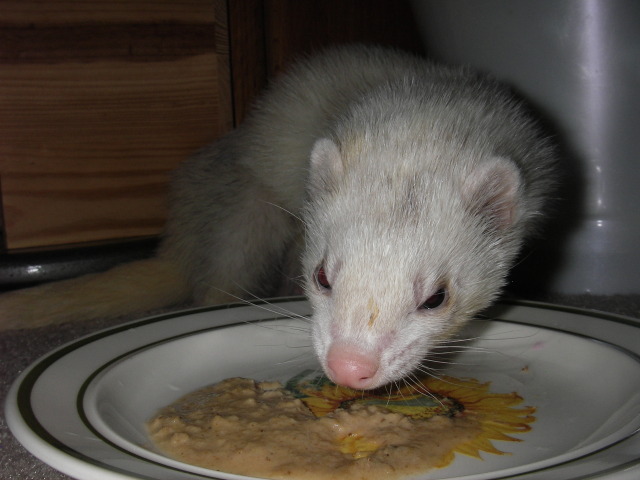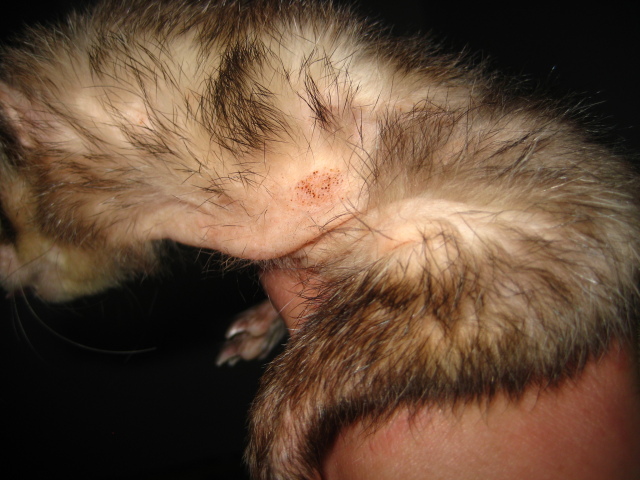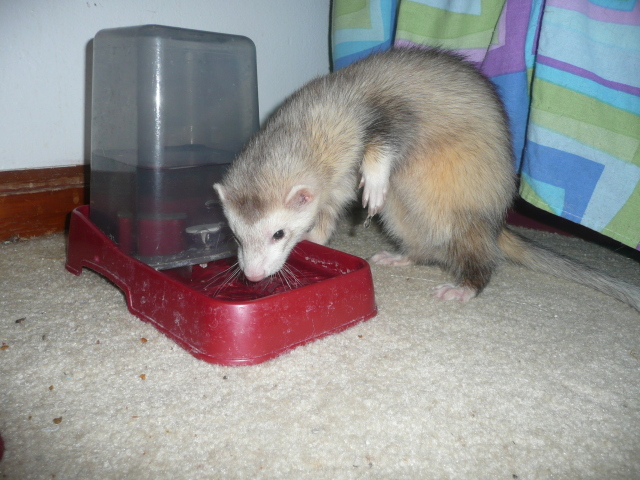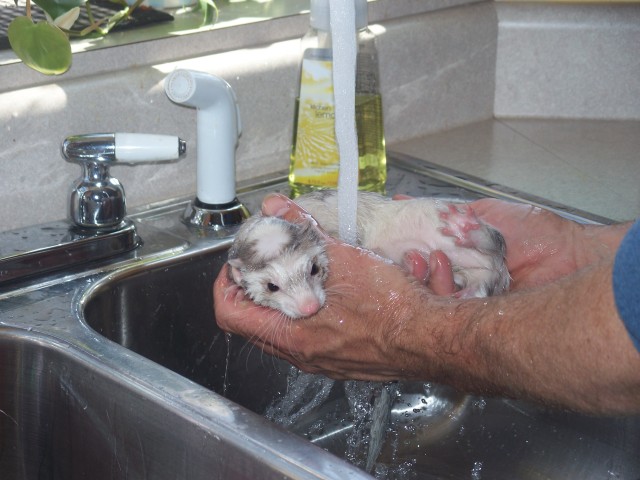QuestionWell she only vomited once and after that had happened she was running around like her old self. I have taken her to the vet about almost 2 months ago. I live in Arlington and the vet seemed to know her stuff.
But my ferret only had that problem that one day and it was only that one time. So I didn't know if I really needed to take her back, since it seems like nothing is really bothering her. She hasn't lost weight or changed anything about her normal daily activity.
-------------------------------------------
The text above is a follow-up to ...
-----Question-----
Well my ferret still eats all the time and constantly drinks water and is very active. Do you think her vomiting is because of something she might have found on the floor?
-------------------------------------------
The text above is a follow-up to ...
-----Question-----
What exactly do a ferrets hairballs look like when they are coughed up?
My ferret threw up the other day but it was all clear. It looked like there was mucus in it or something. And she's been perfectly fine ever since. Her behavior hasn't changed or anything for that matter. What could it be?
-----Answer-----
Hi Christina:
In all my years of owning ferrets, I've never seen a hairball be 'coughed up'. I think that coughing them up is a "cat thing" :-) Ferrets usually tend to collect fur within the folds of their intestinal walls, not in their stomach or throat, so by the time there is a 'hairball', there is a problem.
The only way to remove a hairball, once it has formed, for a ferret is surgery and if that surgery is not done promptly, the ferret usually dies (very common). Any ferret who stops eating, refuses food, vomits food after eating, or has scanty or thin bowel movements (usually indicates a "partial" blockage, even though some small amount of stool is still being passed. Even with a partial blockage, the hairball can cause complications that will quickly take the ferret's life; so surgery by an experienced ferret vet needs to be done as soon as possible. Whatever the ferret eats simply builds up behind the blockage and puts the blockage under more pressure; thus more likely to rupture. The intestine *can* rupture without warning and the ferret dies a very very painful and very unnecessary death.
Early symptoms of a partial or full blockage are refusal to eat, or eating a lesser amount, vomiting after eating, and/or scant or skinny poops. ANY ONE of these symptoms indicate a trip to the vet is in order immediately. Ferrets are very very stoic and often won't show any pain or discomfort until death is imminent. Infection can even build within the intestines and abdominal cavity, which makes surgery much more dangerous, so that's another reason to get the surgery as soon as possible. Symptomatic HAIRBALLS DO NOT GO AWAY BY THEMSELVES....EVER. Ferrets should NEVER go 24 hours without food AND fluids - if your ferret stops eating or drinking, you have an emergency.
The best way to PREVENT hairballs, is to give EVERY FERRET about a 1" ribbon of either ferret or cat laxative (in a tube at any pet store) WEEKLY all the time and DAILY while the ferret is shedding. The hairball remedy (or laxative) grabs" onto the tiny hairs before they can collect enough to form a ball as such and moves them out of the ferret's body with regular bowel movements. Most ferrets quickly learn that the malt flavored hairball remedies are a great 'treat', so they take it readily. I have, upon occasion, encountered people who don't use a hairball remedy and they usually end up paying for a surgery for blockage, THEN become believers. Using hairball remedy regularly for ferrets is really not negotiable, and it should be started the day you bring the ferret home with you....try to remember to bring some hairball remedy home too and be consistent in giving it.
During the seasons when ferrets are shedding (watch their bedding closely and you will be able to tell when shedding starts and stops; or you will notice it on your clothing after holding them), you should give a 1" rounded ribbon (as it comes out of the tube) of cat or ferret laxative DAILY to prevent hairballs and keep any ingested fur moving thru the system. Most ferrets LOVE malt flavored hairball remedies (or "cat or ferret laxative" - same item)
Another very effective way to ensure your ferret doesn't get a hairball is to give a 'plucking bath' about twice in a four day period of time as soon as you notice any shedding. Using the kitchen sink, let the ferret rest his back feet on the bottom of the sink while you support his upper body with one hand and give him a good lather with the other hand. Be sure to keep the water very warm (ferret body temperature is around 101.3 degrees...so, that is approximately like a person with a temperature; remember how chilly it feels to take a bath or shower? They need it warm too. If they struggle a lot or shiver, the water is too cool. You will know if the water is too hot if the ferret begins to pant, immediately start slowly cooling the water to bring the ferret's body temperature down. (IMPORTANT NOTE: When ferrets pant, it indicates they are overheated and they can die in just minutes if not cooled down. They are not like dogs and do not have a built in cooling system that works by panting.) You can use Johnson & Johnson baby shampoo (it won't burn their eyes, so you can lather them up all over) and lather the ferret up really well. Rinse with very warm water until you are sure the shampoo is all out.....and as you rinse, grab about a 1" square piece of fur and, starting at the butt, pinch the fur between your thumb and forefinger and gently pull against the way it grows. IF it is time, after the ferret has been in the water long enough (take your time soaping them up and rinsing so that the fur has a chance to soften), it should easily pull right out in your hand, leaving a short, new coat underneath the old one. Do as much as your ferret will tolerate, then stop and do it again the next day or two days later - depending on how much the ferret is shedding. If you don't get out a good handful of fur the first time, wait a couple days before trying again; the ferret is probably just starting into shedding. Once shedding is really active, the fur will easily come out in bit globs during the rinsing phase...keep a trashcan handy to drop it into because it won't only clog your ferret's plumbing, but it will clog your house plumbing too!
You will know your ferret is finished shedding when 1: there is no longer loose fur in the bedding daily and, 2: a 'plucking bath' as described above does not produce a any really impressive amount of fur after the very warm rinse phase. I think the good scrubbing is very important first - because it makes the fur 'squeaky clean', then it prepares the fur for the warm rinse and plucking. I usually only pluck from the neckline down to and includin the tail on the back and both sides of the ferret. Once you ferrets get used to the plucking (and getting shedding season over in about three or four days instead of a couple weeks), they really seem to enjoy it if done properly.
After a ferret has had hairball removal surgery, it is very important that they have about 1/2" ribbon of cat or ferret laxative DAILY, since the stitched area in the intestine will forever be a 'catch-all' and tend to collect any loose fur or other small items your ferret may ingest such as rubber bands, pencil erasers or other small items.
Fireproofing your home really well is another excellent way to ensure your ferret doesn't get an intestinal blockage - NOT ALL BLOCKAGES ARE FUR...MANY ARE OTHER ITEMS. You can get additional information about how to fireproof your home here:
http://www.ferretcentral.org/FAQ/index.html
Scroll down to #5: "How Can I Best Fireproof My Home"
Check out the other information while you are at Ferret Central - it's a great place for information of all kinds on ferret. Also, a book called FERRETS FOR DUMMIES by Kim Schilling is a 'must have' for both new and old ferret owners.
Hope that answers your question, Christina. Don't hesitate to write again if I can be of further assistance.
Sincerely,
Jacques Rodgers
-----Answer-----
Hi Crystal:
You didn't mention in the first email that your ferret is vomiting. How often has it been vomiting and how often? Has there been a change in food lately? A new pet in the house? People in the house with the flu? Have you taken your ferret out around other people or animals recently previous to the vomiting beginning?
Ferrets CAN get the flu from us and they may vomit a time or two over the couse of a day, but it shouldn't last longer than that. If it does, they dehydrate quickly and need extra fluids to survive an illness that lasts longer than a day or two.
There are other reasons that can cause a ferret to vomit also. Any ferret who has been vomiting for 24 hours or more really needs to be examined by a ferret, even if they are eating - something is going on. Vomiting is not 'normal' for a ferret, like it is for a dog or cat. Persistent vomiting in a ferret always indicates something is going on. Your vet may need to do a complete blood panel, barium xrays and a physical exam before he can tell you what is wrong, but something is wrong.
Is your ferret maintaining his/her weight, or losing weight? Any weight loss in a ferret is also a sign of serious illness that needs vet evaluation.
Ferrets are very very stoic and will act like ferrets right up until the point that they literally fall over and die. This is a carryover from wilder days when even appearing ill or weakened would usually let predators know that they are an easy target.
If a ferret is not eating normally, not pooping normally, vomiting regularly, losing weight, or more inactive than usual, these are ALL reasons to have a ferret examined by a vet who specializes in ferrets.
If you let me know where you live, I may be able to suggest some vets in your area that have been recommended by other ferret owners, so they are used to working with ferrets, a very specialized practice.
Hope that helps answer your questions. Don't hesitate to write again if it did not. Best of luck to your ferret. It's so hard on us when they are sick. But it's always better to get proper veterinary care sooner than later. I know a LOT of folks who were apparently waiting for ALL symptoms before they took their ferret to a vet and they usually end up with a dead ferret or an even higher vet bill because the illness progresses or involves other organs over time, or becomes "un-fixable" because the owner waited too long. It's ALWAYS best with a ferret to be "better safe than sorry". Much more so than with cats, dogs, etc. Ferrets are truly unique critters that require an owner who is watching DAILY for changes in eating, weight, pooping or activity levels. One day can make the difference between life and death for a ferret. They are only 2-3 lbs, so they don't have the resources to fight illness that larger animals have and it's important to catch illnesses early. That's truly my best advice. Hope that helps!
Sincerely,
Jacquie Rodgers
AnswerHi Cristina:
First off, please accept my apology for calling you "Crystal" in your last question! Not sure where my brain was. I always get very concerned when I think there is a ferret with an intestinal blockage..
I can't really say that one incident of vomiting with no other symptoms whatsoever is anything to worry about at this time. It is a 'first alert' and should immediately tell you to keep track IF she vomits again, gets diarrhea, stops eating, or in any way doesn't act like herself. Ferret owners need to be "poop experts" - that one thing really tells us a lot about the overall health of our ferrets, so we do tend to watch it closely for any changes in color, texture, thickness, frequency and size.
From what you are telling me, if I understand you properly, your ferret only vomited one time, is eating and pooping fine, playing fine - no other symptoms. If I have that correct, the only recommendation I would have is to just keep an eye out (as every ferret owner ALWAYS should) for any of the above changes.
I give my kids the "Rule of Three". Each session of vomiting OR diarrhea counts as "One". When they get a total of three within a 24 hour period of time, I take mine to the vet for a checkup. EACH 24 HOUR PERIOD STARTS COUNTING OVER AGAIN AT 1....so your ferret MAY vomit ONCE a day for THREE DAYS in a row before he needs to go to the vet. That could be one session of vomiting (Counts as 1); then some funky green diarrhea (counts as 2)....but then the next poops are fine and the ferret is eating, not vomiting anymore, etc. So, that ferret would have only counted as a "2" that day - one more bad poop or vomiting session, OR if the ferret is not acting himself, or not eating - that would be the third point......and we're off to the vet.
For me, that's an 'easy' way to know WHEN to take a ferret to a vet. When I say "vomiting session" I am referring to one instance of a ferret throwing up, watery or food - doesn't matter. Then, if the ferret vomits again 10 minutes later....that's 2.....and so on. I hope that makes sense. So, if you always use the Rule of Three, you will always get your ferret to a vet when it needs to go without someone having to tell you. Of course, if the ferret vomits or poops blood, or some other strange factor to the equation, it immediately goes to Level 3 and the ferret goes to the vet without waiting for further consideration.
Thanks again for your question. I think I initially read too much into your ferret being sicker than it was (THANK HEAVENS!!) I am used to people writing when their ferrets are really really sick, so I *assumed* too much. I'm happy to report that I *think* it sounds like there really isn't anything to worry about at this time.
If anything changes at all or if you have any further questions, please don't hesitate to write again and I will do my best to help. I always recommend a book called FERRETS FOR DUMMIES by Kim Schilling for all old and new ferret owners - there is just SO MUCH very important information in there that EVERY ferret owner should know. Also there are various websites with information too. Here are a few: http://www.ferretcentral.org ; http://www.ferretuniverse.com and http://www.miamiferret.org (especially for illnesses).
Take care & hug that sweet little fuzzy one!!
Sincerely,
Jacquie Rodgers

 vomiting ferret that is otherwise happy
QuestionQUESTION: Dear Emilee,
first of all, you and yo
vomiting ferret that is otherwise happy
QuestionQUESTION: Dear Emilee,
first of all, you and yo
 Choosing A Second Ferret.....Vaccine Information
Question
Sirius Black
My lil guy Sirius is one y
Choosing A Second Ferret.....Vaccine Information
Question
Sirius Black
My lil guy Sirius is one y
 Skin Condition
Question
Chewie
I own 5 ferrets, ranging from 3 to 5. I
Skin Condition
Question
Chewie
I own 5 ferrets, ranging from 3 to 5. I
 Ferret colors
Question
Mitch
Hello Cindy!
I have just adopted a new
Ferret colors
Question
Mitch
Hello Cindy!
I have just adopted a new
 Concerns with Molly
Question
Molly when we firat go
Hello, I have a girl fe
Concerns with Molly
Question
Molly when we firat go
Hello, I have a girl fe